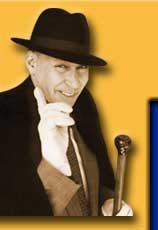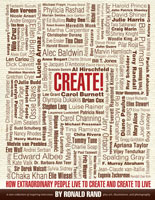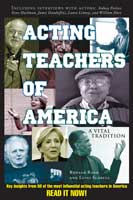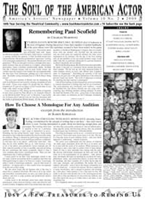





25 COUNTRIES! 20 STATES!
RONALD RAND starring as HAROLD CLURMAN
in RONALD RAND’s acclaimed Solo Performance Play
 |
 |
|
 |
 |
 |
CELEBRATING ITS 20TH YEAR! 25 COUNTRIES! 20 STATES! RONALD RAND starring as HAROLD CLURMAN in RONALD RAND’s acclaimed Solo Performance Play |
PBS American Masters |
What Harold Clurman means to us Today For other pages about Harold Clurman visit the following
links: Harold Clurman Today
And it was because of his unflagging embrace of life, Clurman awoke us to a view of ourselves, with an eternal belief in the human goodness of every being on this planet, which continues to inspire us, especially today. Throughout his half century of directing over forty of the most important plays of our times, (like “Bus Stop” with Kim Stanley, and “A Member of the Wedding” with Julie Harris), through his influential dramatic criticism and writings as theatre critic for “The Nation,” and his many books including The Fervent Years and On Directing, (which are required texts in schools), and through his teaching, he reminded us that ““even if we’re such a money culture, even if life is a constant struggle, embrace, understand, and feel for everything!” Clurman was essentially a “lover of life.” An unforgettable individual whom once you came in contact with his whirlwind of passion and a verve and vigor that could put to shame those a third his age, his irresistible humor, humanity and idealism, you would become intoxicated by his love for actors, the theatre, ideas, but always people – and simple reason, even in the midst of a world gone mad. Harold Clurman would have been the first to debunk the notion he was born any more special than the next person. But what he did was take what he was given, and choose to say to the world, that ultimately, we’re all linked to one another by an invisible thread, delicate and un-seeable, but that it’s up to us to build a better world for one another, with infinite love and care, even in the uncomfortable terrain we face every day. From his beginnings, having grown up on the Lower East Side of Manhattan, he was literally transformed when his father took him as a child to see the great Yiddish actor, Jacob P. Adler perform in “Uriel da Acosta.” (Years later he would marry his daughter, Stella Adler, whom he also convinced to join The Group Theatre and act in many of their important productions, including Odets’ “Awake and Sing” and “Paradise Lost.”) As a young man Clurman journeyed to Paris and studied at the Sorbonne, sharing an apartment with Aaron Copland, and began to develop an unceasing love of the Arts, a rich understanding of how they were related to the growth of all those who came in contact with them, and what they meant to the lifeblood of a country’s culture. He was very fortunate when he returned to become involved with The Provincetown Players and The Theatre Guild, two very prestigious theatres of the 20’s and 30’s, coming in contact with such theatre legends as Eugene O’Neill, Robert Edmund Jones, Alfred Lunt and Lynn Fontanne, and witnessing many of the notable plays of the period, including America’s first Nobel Prize winning-play, O’Neill’s “Beyond the Horizon.” All of this ended up giving him a most unique perspective of what theatre was like, but more importantly, what it was lacking. In the winter of 1930, he began to give a series of inspiring talks on why there needed to be a new kind of theatre formed to truly convey “the life of our times,” with the entire company of actors to be trained in the same way, and to work on only new American plays. Through his fury and magnetism he aroused all who came to listen, drawing the likes of Stella Adler, Clifford Odets, Sandy Meisner, Bobby Lewis, Franchot Tone, Morris Carnovsky, Phoebe Brand, just to mention a few, even Katharine Hepburn. Thus the Group Theatre was born, co-founded with Lee Strasberg and Cheryl Crawford, literally “talked into existence by Clurman,” as Aline MacMahon once said. For nearly fifty-five years, Clurman devoted himself to spreading his philosophy across the country and the world, with an unceasing persistence and audacity, culminating with him being recognized as the “the elder statesman of the American Theatre.” “ Here we are riding on this little speck of dust, in the middle of this magnificent and mysterious universe.” (Clurman regales us in my play) “And we come into it all separately, don’t we? What gives us our definition? Our participation! That’s what illuminates the greatest works of art. It’s up to us how we shape our daily lives. So go out! Go out and do your darndest to do the things that are proper to do, any way you know how to do them! Because truth is like castor oil, it’s bitter to swallow, people don’t want it. But when their mouths are open – you pour it in!” And even if we aren’t perfectible, we must act as if we are. Because life’s essentially irrational. It’s not fair, it’s not easy. It’s doomed for failure, it’s terrible…and glorious!” — Ronald Rand
For other pages about Harold Clurman visit the following links:
|
 |
© Copyright Ronald Rand 2003. All rights reserved.
|